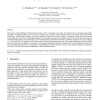Free Online Productivity Tools
i2Speak
i2Symbol
i2OCR
iTex2Img
iWeb2Print
iWeb2Shot
i2Type
iPdf2Split
iPdf2Merge
i2Bopomofo
i2Arabic
i2Style
i2Image
i2PDF
iLatex2Rtf
Sci2ools
113
click to vote
AUTOMATICA
2007
2007
Correlation-based tuning of decoupling multivariable controllers
The iterative method labelled Correlation-based Tuning (CbT) is considered in this paper for tuning linear time-invariant multivariable controllers. The approach allows one to tune some elements of the controller transfer function matrix to satisfy the desired closed-loop performance, while the other elements are tuned to mutually decouple the closed-loop outputs. Decoupling is achieved by decorrelating a given reference with the non-corresponding outputs. The controller parameters are calculated either by solving a correlation equation (decorrelation procedure) or by minimizing a cross-correlation function (correlation reduction). In addition, the preferred way of exciting a 2×2 system for CbT is investigated via the accuracy of the estimated controller parameters. It is shown that simultaneous excitation of both reference signals does not improve the accuracy of the estimated controller parameters compared to the case of sequential excitation. In fact, one must choose between low e...
| Added | 08 Dec 2010 |
| Updated | 08 Dec 2010 |
| Type | Journal |
| Year | 2007 |
| Where | AUTOMATICA |
| Authors | Ljubisa Miskovic, Alireza Karimi, Dominique Bonvin, Michel Gevers |
Comments (0)

